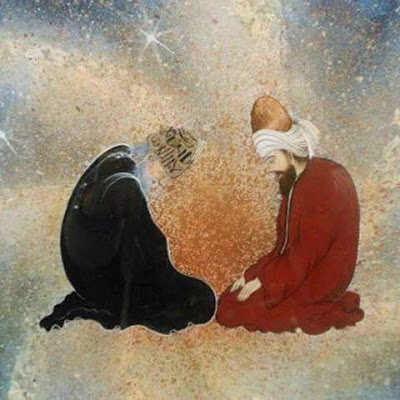Death Of Deathlessness
Returning to the story of the Prince of the Faithful, ‘Alí—may God honour his person!— and how generously he behaved to his murderer.
He said, “Day and night I see the murderer with my eyes, (but) I have no anger against him, Because death has become sweet as manna to me: my death has laid fast hold of resurrection.”
The death of deathlessness is lawful to us, the provision of unprovidedness is a bounty to us.
’Tis death outwardly but life inwardly: apparently ’tis a cutting-off (decease), in secret (in reality) ’tis permanence (life without end).
To the embryo in the womb birth is a going (to another state of existence): in the world it (the embryo) blossoms anew.
“Since I have intense love and longing for death, the prohibition do not cast yourselves (into destruction) is (meant) for me, Because (only) the sweet berry is prohibited; (for) how should it become necessary to prohibit the sour one? The berry that has a sour kernel and rind—its very sourness and disagreeableness are (serve as) a prohibition of it. To me the berry of dying has become sweet: (the text) nay, they are living has come (from God) on my account.
Slay me, my trusty friends, slay me, vile as I am: verily, in my being slain is my life for evermore. Verily, in my death is my life,
O youth—how long shall I be parted from my home? Until when? If there were not in my staying (in this world) my separation (from God), He would not have said, ‘Verily, we are returning to Him.’” The returning one is he that comes back to his (native) city, and (fleeing) from the revolution of Time approaches the Unity. The Masnawi – Volume 1, 3925-3940
He said, “Day and night I see the murderer with my eyes, (but) I have no anger against him, Because death has become sweet as manna to me: my death has laid fast hold of resurrection.”
The death of deathlessness is lawful to us, the provision of unprovidedness is a bounty to us.
’Tis death outwardly but life inwardly: apparently ’tis a cutting-off (decease), in secret (in reality) ’tis permanence (life without end).
To the embryo in the womb birth is a going (to another state of existence): in the world it (the embryo) blossoms anew.
“Since I have intense love and longing for death, the prohibition do not cast yourselves (into destruction) is (meant) for me, Because (only) the sweet berry is prohibited; (for) how should it become necessary to prohibit the sour one? The berry that has a sour kernel and rind—its very sourness and disagreeableness are (serve as) a prohibition of it. To me the berry of dying has become sweet: (the text) nay, they are living has come (from God) on my account.
Slay me, my trusty friends, slay me, vile as I am: verily, in my being slain is my life for evermore. Verily, in my death is my life,
O youth—how long shall I be parted from my home? Until when? If there were not in my staying (in this world) my separation (from God), He would not have said, ‘Verily, we are returning to Him.’” The returning one is he that comes back to his (native) city, and (fleeing) from the revolution of Time approaches the Unity. The Masnawi – Volume 1, 3925-3940



Yorumlar
Yorum Gönder